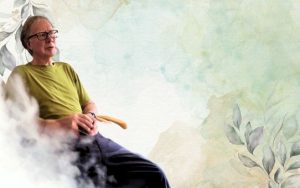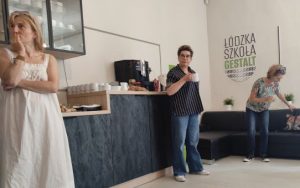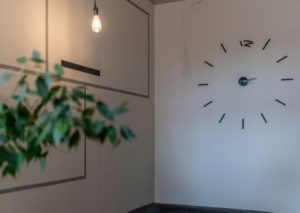Stage I – Lodz Gestalt School’s developmental year program. The Development Year at the Lodz Gestalt School is the first stage of a four-year psychotherapy course. Stage I is experiential and involves working on one’s own in a group process.
Program of activities
1. opening group: interpersonal training with elements of psychoeducation and integration introducing the philosophy of Gestalt thinking (40 h)
Interpersonal training is a special group process experience aimed at integration, observing oneself in relationships with other Participants, exploring one’s feelings in different types and phases of contact (including resistance), receiving feedback from others, experimenting in safe conditions with entering into deeper contact, sharing personal experiences, and building bonds. The training includes elements of psychoeducation aimed at coaching the way of communication that makes it possible to establish contact with another person. It is, as it were, learning the language that the participants will use to communicate with each other over the coming months so as to experience the group process as fully and with as much awareness as possible. Classes are also devoted to getting to know each other’s Participants and the initial integration of the group.
During the class, in addition to experiencing the group process, you will learn:
– how to communicate directly
– how to give feedback
– How to express your needs and expectations precisely and with care for your own and the other person’s boundaries
You will also learn what the Gestalt philosophy of thinking is/what distinguishes it from other philosophies, the basic tenets: awareness, contact, being here and now.
You will also get to know your fellow travelers during the development year.
2. the history and roots of Gestalt
Gestalt theory essence/assumptions, Gestalt history/roots, philosophical background
Participants will learn about the roots, origins and philosophical underpinnings of Gestalt in a hands-on, experiential way. The purpose of the workshop is for Participants to feel the essence of the Gestalt current, to get acquainted with the most important concepts, the names of the creators, to “taste”, “touch” the method.
During the workshop:
– you will learn the names and get acquainted with the achievements of Gestalt creators
– you will learn about the philosophical roots of Gestalt such as anthropology, psychoanalysis, existentialism, phenomenology, Eastern philosophies and Jewish roots, character psychology
– you will learn how important body work and art are in Gestalt
Literature:
1. “Fritz Perls” Clarkson Petruska, Jennifer Mackewn
2. “Holism in terms of Gestalt psychotherapy”, Sylwia Kowalska [w:]
<http://bibliotekagestalt.pl/2021/01/03/kowalska-sylwia-holizm-w-ujeciu-terapii-gestalt-tekst/>
3. “Gestalt psychological help” by Charlotte Sills, Sue Fish, Phil Lapworth
4. “Between Psychology, Psychotherapy and Practical Philosophy. Searching for an Authentic Life in the Gestalt Current” Mariola Paruzel-Czachura
3. key concepts in Gestalt theory
Consciousness, (including Internal Consciousness, External Consciousness, Indirect Consciousness) Kurt Lewin’s field theory, figure/background
During the workshop, you will learn about what it is:
– consciousness including: internal, external and indirect consciousness as tools for viewing what contact brings,
– Field theory (why and how to observe the field, how to get information from the field about oneself, about the other person about the common),
– figure and background as the essential frame structuring the work.
Literature:
1. “Fritz Perls” Petrūska Clarkson
2. “The Theory and Practice of Gestalt Therapy” by Jerzy Mellibruda
3. “Phenomenon” Holism in terms of Gestalt therapy – Sylwia Kwiatkowska; p.51
<http://bibliotekagestalt.pl/dokumenty/Refleksje-o-Teorii-Pola.pdf>
5. “What on earth is the matter with me! A Gestalt approach to psychopathology” Frans Meulmeester [w:]
<https://drive.google.com/file/d/1dJQu6ic2lEDzOMT3LpQ6y-10GsziJ0X2/view>
4. key concepts in Gestalt theory cont.: the cycle of experience/cycle of self-regulation
During the workshop, participants experience in a conscious way how they interact with the environment and themselves, how they satisfy their needs, how they regulate themselves. They also discover what kind of difficulties accompany these processes. The class is based on Joseph Zinker’s cycle model, which distinguishes such stages of the self-regulation cycle as impression, awareness, mobilization, action, contact (satisfaction of need), assimilation, withdrawal.
During the workshop you will learn:
– what is the cycle of self-regulation
– what are the next stages of the cycle
– you will learn experientially about each phase and its relevance to you and your way of coming into contact
Literature:
- Joseph Zinker “The creative process in Gestalt psychotherapy”, Jacek Santorski & Co Warsaw 1991
- Ch. Sills, S. Fish, P. Lapworth “Gestalt psychological help,” Institute of Health Psychology 1999
- “The contact sequence: an absurdly brief description of a typical model”, Dan Bloom [w:]
5. basic concepts of Gestalt theory cont.: Mechanisms of building/communicating contact
Each person comes into contact in their own unique way. Over the years (most often unconsciously), he develops patterns that help in dealing with both the other person and his own experience. What was once (in childhood) useful and helped to cope with these processes, most often now (in adult life) requires modification related to the realization of changes in the conditions of one’s functioning.
During the workshop you will discover and explore what they are:
Contact building/communication mechanisms such as introjection, retroflection, projection, pro-flexion, confluence, deflection, egotism.
Literature:
- “The Theory and Practice of Gestalt Therapy” Jerzy Mellibruda
- Gestalt journal – “Mechanisms of contact avoidance” Jacek Pierzchała
- “Gestalt the art of contact” by Serge Ginger
- “Gestalt Therapy” by S. Perls Frederick
- “Gestalt Therapy, (100 Key Points),” by Dave Mann, 2010.
6. basic concepts of Gestalt theory cont.: creative self
Gestalt says that people experience change in such a way that they become more and more themselves (paradoxical theory of change). This happens when we fully activate our creative self. Then we feel the greatest satisfaction with life, because we realize our desires and needs. The creative self is something of a “living” self. However, it is usually the case that over the course of a lifetime we acquire certain rigidities/blocks that prevent or hinder us from being fully creative/”alive.”
During the workshop you will have the opportunity to
– look at 10 roadblocks that hinder lively/creative contact with the environment
– get a sense of what the creative self and creative adaptation are
1. Joseph Zinker “The Creative Process in Gestalt Psychotherapy”, Jacek Santorski & Co Warsaw 199
7 Therapeutic relationship, boundary contact, basic therapeutic skills in Gestalt therapy
Gestalt therapy is a process happening over time between the therapist and the client in a special relationship. In this relationship, as in a dance, two people coexist who meet at the border of contact, that is, where one person “ends” and the other “begins.”
During the workshop you will learn/experience:
– what is contact
– What is coexistence at the border of contact and also
– you will understand what the co-creation of quality in the relationship is (what one person brings, what the other brings, with what is shared)
– You will practice basic communication skills that make it easier/possible to be with another person.
Literature:
1. “The Theory and Practice of Gestalt Therapy” by Jerzy Mellibruda
2. “Gestalt Psychotherapy” by Victor Chu
3. “Gestalt the art of contact” by Serge Ginger
4. “Give a Hand” D.W. Johnson, (1992) Warsaw: Wyd. PTP
8. body work, breath work in Gestalt
The embodied self is the self enchanted in the body. In Gestalt psychotherapy, feeling the body/feeling the body is one of the most important tools for exploring contact with another person. During the workshop you will work on:
– Increasing body awareness (breathing, movement, gestures, feeling body sensations) when interacting with another person,
– The ability to observe another person’s body (movement, gestures, posture, build, breathing) as a source of information about him,
– Experiencing the bodily self at the boundary of contact, the subject and object of contact,
– The bodily self as a developmental process,
– recognizing tensions in the body as a source of information about the self, linking them to life history, understanding bodily ailments in the context of emotional/relational suffering
Literature:
1.Kepner, J. I. (1991). The body in the process of Gestalt psychotherapy. Hollow Cloud.
2.Ginger, S., Drabik, W., & Zaleska-Stolzman, M. (2004). Gestalt-the art of contact. Publisher. Jacek Santorski & Company
3 Marzena Barszcz, “Psychotherapy Through the Body.”
9. man in the environment: ecology in Gestalt
Ecology is the science of relationships between organisms, including humans and their environment. Man is part of a larger whole, which is his environment. By increasing one’s own awareness in personal development, a person expands awareness of his own influence and the exchange between himself and those around him. The workshop reveals several aspects of gestalt philosophy in terms of ecology. You will learn:
– How focusing on the here and now is consistent with nature
– What is meant by the influence of the environment on humans and the co-creation of the environment by the individual, and how this is done in a continuous exchange
– How the pursuit of equilibrium in natural processes interacts with the pursuit of equilibrium of man as a person in all the diversity of his experience
– you will realize that life as a process that permeates you and nature is one and the same.
Literature:
- Affiliation. How to find your way home, Toko-pa Turner, 2022
- Gestalt Therapy, Perls, Hefferline, Goodman, 1951
- Fritz Perls (Key figures in the Counseling and Psychotherapy series), Clarkson, Mackewn, 2008
- Gestalt – The Art of Contact, Serge Ginger, 2004
10. development year summary, farewell, assimilation
Closing workshop of the Gestalt School Development Year. Participants summarize, conclude, assimilate the experience of their own development work of recent months. They are also consciously saying goodbye to their group’s co-participants and preparing to make a decision on whether to continue their psychotherapy school at Stage II.




